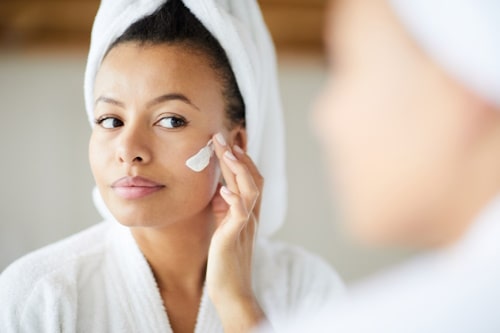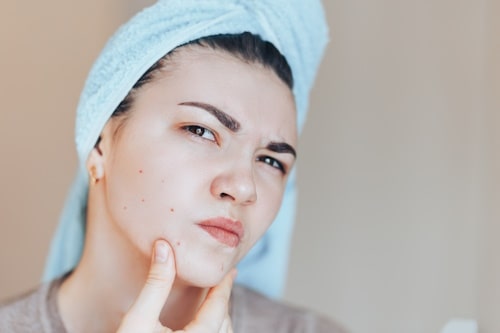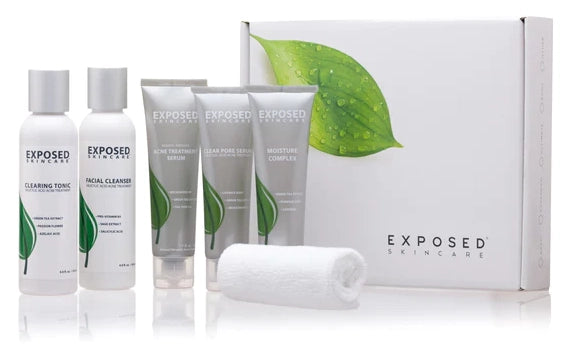You've heard about the benefits of Greek yogurt for digestion and probiotics, but what about using yogurt for acne treatment? While the internet is filled with anecdotes and tutorials about slathering yogurt face masks for acne breakouts, the science behind it paints a different picture.
This blog post explores why yogurt for acne may not be the best choice for your skin and what alternative solutions could offer better results. Continue reading and be one step closer to clearer skin.
Also read: How to choose the best acne treatment
Biggest Take-Aways:
- Despite its health benefits, Yogurt can contribute to acne, particularly for those with a milk allergy.
- The probiotics found in yogurt have not been proven effective in topical treatment of acne.
- If you are searching for acne solutions, it's advisable to avoid home remedies like yogurt that lack scientific backing and can potentially worsen your condition.
- Exposed Skin Care offers scientifically formulated products specifically designed to treat acne effectively, providing a safer and more reliable alternative to yogurt.

The Downside of Using Yogurt for Acne Treatment
Yogurt has been lauded for its probiotic properties and is often suggested as a DIY solution for acne. However, there are some compelling reasons to reconsider using this dairy product on your face.
May Cause Allergic Reactions and Skin Irritations
While yogurt is a food item many enjoy, it can also lead to severe skin irritations or allergic reactions when applied topically. Cow's milk, a primary yogurt component, contains proteins some people may be allergic to. When you apply a yogurt mask to your face, you risk the development of:
- Rash: Red bumps that can cause itching and discomfort.
- Dermatitis: Inflammation of the skin that can worsen existing acne symptoms.
- Rosacea: Aggravation of this skin condition leads to redness and flare-ups.
Despite its thicker consistency and higher protein content, Greek yogurt might also lead to allergic reactions and skin irritations, much like regular yogurt. Therefore, it isn't necessarily a safer or more effective option for acne treatment.
Potential to Clog Pores and Worsen Acne
Believe it or not, applying yogurt could contribute to acne by clogging your pores. Here's what you need to know:
- Sebum: Yogurt may disrupt the natural sebum production on your face. An imbalance in sebum, an oily substance, can lead to acne production.
- Dead Skin Cells: Yogurt masks don't exfoliate well. The accumulation of dead skin cells could clog pores, worsening acne breakouts.

Hormonal Imbalance and Acne Vulgaris
While yogurt contains probiotics that may reduce digestive issues, these benefits do not directly translate to clearer skin. Research shows that consuming high-glycemic foods like white bread and sugary drinks can worsen acne and breakouts.
Although yogurt is considered a low-glycemic diet food, its hormonal effects can still contribute to acne vulgaris. Studies suggest that cow's milk and other dairy products like ice cream have a possible link to acne due to their hormonal content.
Lack of Scientific Evidence Supporting Yogurt for Acne
The internet may be flooded with testimonies praising the use of yogurt for acne treatment, but hard scientific evidence is sparse. Most claims about yogurt’s acne-fighting abilities are anecdotal at best.
Even if yogurt helps to prevent inflammation throughout the body thanks to its probiotic-rich content, that doesn't mean it will effectively manage acne or promote healthy skin.
Though some studies suggest that a low-glycemic load diet may help reduce acne breakouts, no scientific research conclusively proves that yogurt is the best acne treatment. Moreover, other foods include probiotics that can meet your unique needs for overall health without affecting your skin condition.
Effective Alternatives to Yogurt for Acne Treatment
Salicylic Acid
Another trusted component in acne treatment is salicylic acid, which helps to:
- Exfoliate dead skin cells
- Unclog pores
- Treat acne symptoms like red bumps and inflammation

Benzoyl Peroxide Creams
Benzoyl peroxide is an acne-causing bacteria killer that’s been a staple in acne treatment for years. It:
- Reduces inflammation and excess sebum
- Helps to manage severe acne
- Is backed by scientific research
Non-Dairy Probiotic Supplements
Instead of relying on yogurt for probiotics, try a supplement that can:
- Harmonize gut microbiome
- Reduce inflammation throughout the body
- Support better skin health
The Benefits of Using Exposed Skin Care for Managing Acne
Exposed Skin Care offers a comprehensive range of products to manage acne without causing inflammation. It is formulated to prevent adverse reactions even for people who have dairy allergies.
The benefits of Exposed Skin Care are:
- Facial Cleanser: Unlike a yogurt mask that might worsen your skin's condition, this product removes dead skin cells efficiently, prepping your skin for effective treatment.
- Clearing Tonic: Designed to control pimples and oily skin, this tonic manages what a yogurt-based smoothie or a glycemic load diet might not address regarding acne.
- Treatment Serum: Yogurt is best left for eating, especially if you're lactose intolerant. Our serum penetrates deep to treat the root cause of acne.
- Clear Pore Serum: Ideal for keeping your skin clear and healthy without the risk that comes with the inflammation potentially caused by yogurt and potato chips.
- Derm-X Cloth: While yogurt could aggravate psoriasis, this cloth offers gentle exfoliation to reveal a fresh layer of skin, making it more effective than a peel.
By switching to Exposed Skin Care, you can eat yogurt without worrying about how it might affect acne. It offers a holistic approach to skincare, focusing on the overall well-being of your skin.
Conclusion
The use of yogurt for acne is a debated topic, surrounded by myths and half-truths. While many advocate its probiotic benefits and natural composition as a quick remedy, the evidence strongly suggests that yogurt can contribute to skin problems.
The risks of applying yogurt range from skin irritations due to an allergy to milk to the exacerbation of acne symptoms. Additionally, the myth that yogurt can be an effective acne treatment has little scientific backing.
Most of the claims are anecdotal and lack concrete research to prove yogurt's effectiveness in treating acne or other skin conditions. Thus, turning to yogurt to cure your acne could be futile and worsen the condition if you're unaware that yogurt could cause acne.
While yogurt remains a beneficial addition to a balanced diet, its role in skin care should be questioned. Its high dairy content, especially for those with a milk allergy, makes it a risky choice for topical application on sensitive or acne-prone skin.
Rather than relying on home remedies that have unreliable outcomes, opt for proven acne solutions like Exposed Skin Care. With a product range tailored to acne at its core, it offers a scientifically-backed, effective route to clear skin.
FAQs
Does yogurt cause acne?
While yogurt has many health benefits, it can contribute to acne breakouts, especially for those with a milk allergy or sensitivity to dairy products.
Is Greek yogurt better for acne than regular yogurt?
Greek yogurt might be less likely to cause acne due to its lower lactose content, but it is not a guaranteed acne treatment and can still trigger breakouts.
What about the probiotics in yogurt?
Probiotics in yogurt are good for gut health, but their effects on acne are not proven. They are also less effective when applied topically as opposed to ingested.
Can I use yogurt for other skin conditions?
It's best to avoid using yogurt for skin conditions unless you've done thorough research and testing. Topical application can irritate the skin and cause other issues.
What's the alternative to using yogurt for acne?
Exposed Skin Care offers a range of products specifically formulated to treat acne effectively, bypassing the risks of using yogurt or other home remedies.


















